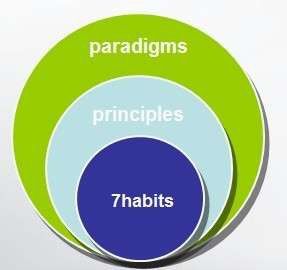Part 1 Paradigms and Principles
Inside-out 2/2
Words
1.outgrowth
The approach we had first taken with him was the outgrowth of years of conditioning and experience in the Personality Ethic.
(formal) a natural development or result of sth 自然发展/结果 通常和of搭配
例:Crime is often an outgrowth of poverty.
造句: A child’s behaviors are often the outgrowth of their parents’ nurturing.
2.supersede[ˌsu:.pə'si:d]
We can see a reality that is superseded by his limited perception.
if a new idea, product, or method supersedes another one, it becomes used instead because it is more modern or effective 通常在被动语态中用superseded by同义 replace, take something’s place, substitute sth for sth
例:Hand tools are relics of the past that have now been superseded by the machine.
造句:Nokia had been superseded by Iphone.
3.Get by on/with it
And for a while we can get by with it- at least in public.
ˌget ˈby (on/in/with sth) to manage to live or do a particular thing using the money, knowledge, equipment, etc. that you have
How does she get by on such a small salary?
She can’t get by on her work for her slacking.
4.shake up
The Personality Ethic tells me I could take some kind of dramatic action- shake things up, make heads roll.
to make changes to an organization in order to make it more effective 同义overhaul:
例:the government’s plans to shake up the educational system
造句: The leader plans to shake up the company’s sales system.
5.precede /prɪˈsiːd/
The inside-out approach says that private victories precede public victories.
to happen or exist before something or someone, or to come before something else in a series
例: a type of cloud that precedes rain
造句:The ceremony was often preceded by a short speech from the president.
Expressions
1.Natural laws are woven into the fabric of every civilized society throughout history. 可以用woven来描述世界是由.....构成的,用了比喻,非常形象。
2. No step can be skipped.
3.Shortcut a natural process
4. open up with their friends 敞开心扉
5.resort to fear and threat/resort to force
6. A thousand-mile journey begins with the first step.
Thoughts
昨天看完书还是有些云里雾里,今天终于理清了一些。这章的作用就是为之后登场的7habits做铺垫。
昨天介绍了什么是paradigm
Paradigms are powerful because they create the lens through which we see the world.
而今天开始引入了Principles和7 habits,那么三者的关系是怎样的?
所以我们如果想做paradigm shift,从根本来说,就是要从这7个习惯开始改变。
从去年7月开始加入读书群,到现在刚好一年,在读书并进行思考以后,我终于体会到什么是Eric说的思维方式的转变与升级。就拿和家人相处来说,以前的我在家里脾气非常大,十分容易对家人发火。而且一吵架觉得只有自己是对的,别人全是错的。就像今天书里举得那例子:婚姻陷入危机的夫妻,他们总是觉得是对方需要改变,而从来不想想自己是不是也有问题。我也是这样,但不知道从哪次吵架开始,我突然问自己:我为什么会生气?我是怎么想的?这不就是书里说的inside-out approach吗?
“Inside-out” means to start first with self; even more fundamentally to start with the most inside part of self-with your paradigms, your character, and your motives.
心理学上也有一种“认知疗法”,可以用来改变思维方式。方法很简单,就是记录下你的想法,接着想自己是如何这样想到的。然后用其他的方式重新思考这个问题,得到新的结果。
所以改变根源还是从认知自己开始,然后逐步提升自己,提升的方式也许就在这7个习惯里。
当然,这个过程是漫长的,也不可能存在一个节点。只有自己慢慢去体会,也许一天你就找到自己的paradigm shift了。
人生就是一场修行,一起来学习接下来的这7个习惯吧!

